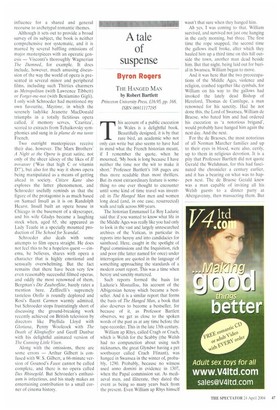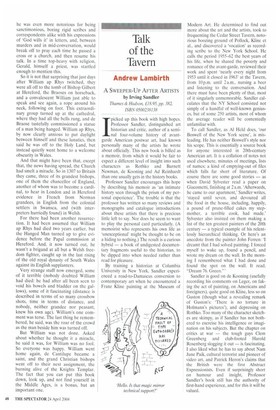A tale of suspense
Byron Rogers
THE HANGED MAN by Robert Bartlett Princeton University Press, £16.95, pp. 168, ISBN 06911117195 This account of a public execution in Wales is a delightful book. Beautifully designed, it is by that rare bird, an academic who not only can write but also seems to have had in mind what the French historian meant, if I remember the quote, when he mourned, 'My book is long because I have neither the time nor the wit to make it short.' Professor Bartlett's 168 pages are thus more readable than most thrillers. But its most extraordinary feature is something no one ever thought to encounter until some kind of time travel was invented: in The Hanged Man men and women long dead (and, in one case, resurrected) walk and talk across 800 years.
The historian Emmanuel Le Roy Ladurie said that if you wanted to know what life in the Middle Ages was really like you had only to look in the vast and largely unresearched archives of the Vatican, in particular its reports into heresy and into candidacies for sainthood. Here, caught in the spotlight of Papal commissions and the Inquisition, rich and poor (the latter named for once) under interrogation are quoted in the language of something approaching the standards of a modern court report. This was a time when heresy and sanctity mattered.
Such reports formed the basis for Ladurie's Montaillou, his account of the Albigensian heresy which became a bestseller. And it is a similar report that forms the basis of The Hanged Man, a book that also deserves to become a bestseller, for because of it, as Professor Bartlett observes, we get as close to the spoken words of the past as at any time before the tape-recorder. This in the late 13th century.
William ap Rhys, called Cragh or Crach, which is Welsh for the Scabby (the Welsh had no compunction about using such nicknames, the great Glyndwr having a pet soothsayer called Crach Ffinant), was hanged in Swansea in the winter of, probably, 1290. Probably, because no witness used anno domini in evidence in 1307, when the Papal commission sat. As mediaeval men, and illiterate, they dated the event as being so many years back from the present. Even William ap Rhys himself wasn't that sure when they hanged him.
Ah yes, I was coming to that. William survived, and survived not just one hanging in the early morning, but three. The first time the rope snapped, the second time the gallows itself broke, after which they hauled him up a third time on this hill outside the town, another man dead beside him. But that night, being laid out for burial in Swansea, William began to move.
And it was here that the two preoccupations of the Middle Ages, violence and religion, crashed together like cymbals, for William on his way to the gallows had invoked the lately dead Bishop of Hereford, Thomas de Cantilupe, a man renowned for his sanctity. Had he not done this, the Lord of Swansea, William de Braose, who hated him and had ordered his execution as 'a notorious brigand', would probably have hanged him again the next day. And the next.
For the de Braoses, the most notorious of all Norman Marcher families and up to their eyes in blood, were also, eerily, up to them in religious devotion. It is a pity that Professor Bartlett did not quote Gerald the Welshman, for this had fascinated the chronicler a century earlier, and it has a bearing on what was to happen next. The de Braosc Gerald knew was a man capable of inviting all his Welsh guests to a dinner party at Abergavenny, then massacring them. But he was even more notorious for being sanctimonious, boring rigid scribes and correspondents alike with his expressions of 'God wills it' in letters, and, between murders and in mid-conversation, would break off to pray each time he passed a cross or a church, and then resume his talk. In a time top-heavy with religion, Gerald, himself a priest, was startled enough to mention this.
So it is not that surprising that just days after William ap Rhys twitched, they were all off to the tomb of Bishop Gilbert at Hereford, the Braoses on horseback, and a convalescent William just able to speak and see again, a rope around his neck, following on foot. This extraordinary group turned up at the cathedral, where they had all the bells rung, and de Braose tastefully commissioned a statue of a man being hanged. William ap Rhys, by now clearly anxious to put daylight between himself and these lunatics, then said he was off to the Holy Land, but instead quietly went home to a welcome obscurity in Wales.
And that might have been that, except that, the news having spread, the Church had smelt a miracle. So in 1307 to Britain they came, three of its grandest bishops, one of them the chancellor of England, another of whom was to become a cardinal, to hear in London and in Hereford evidence in French from Norman grandees, in English from the colonial settlers in Swansea, and (with interpreters hurriedly found) in Welsh.
For there had been another resurrection. It had been assumed that William ap Rhys had died two years earlier, but the Hanged Man turned up to give evidence before the Papal commission at Hereford. And, it now turned out, he wasn't a brigand at all but a Welsh freedom fighter, caught up in the last rising of the old royal dynasty of South Wales against its English supplanters.
Very strange stuff now emerged, some of it terrible (nobody doubted William had died: he had after all been seen to void his bowels and bladder on the gallows), some of it fascinating (distance is described in terms of so many crossbow shots, time in terms of distance, and nobody, neither grandee nor peasant, knew his own age). William's one comment was terse. The last thing he remembered, he said, was the roar of the crowd as the man beside him was turned off.
But William was not done. Asked about whether he thought it a miracle, he said it was, for William was no fool. So everyone was happy. William went home again, de Cantilupe became a saint, and the grand Christian bishops went off to their next assignment, the burning alive of the Knights Templar. The fact that you can put this book down, look up, and not find yourself in the Middle Ages, is a bonus, but an important one.



















































































 Previous page
Previous page